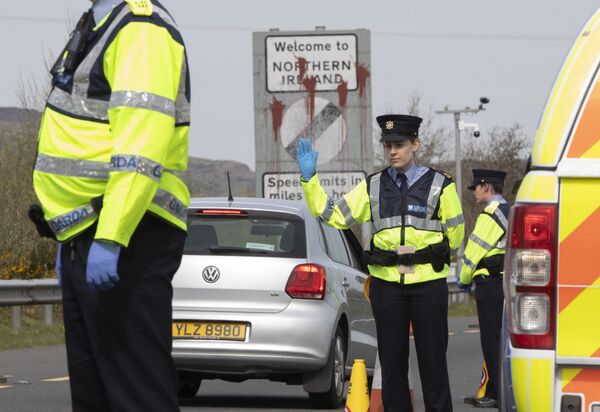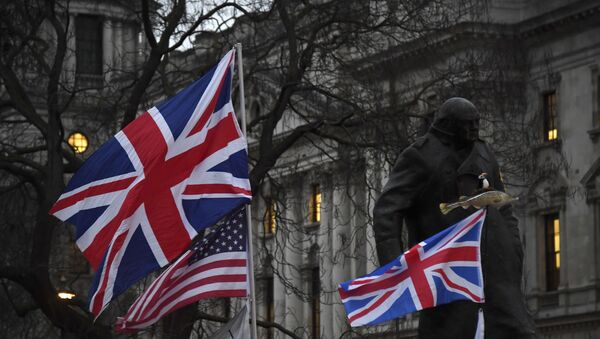Former Tory Party leader Iain Duncan Smith has admonished Joe Biden for “lecturing” Britain over a bill that would rewrite parts of the EU withdrawal agreement, writes The Times.
“We don’t need lectures on the Northern Ireland peace deal from Mr. Biden. If I were him I would worry more about the need for a peace deal in the USA to stop the killing and rioting before lecturing other sovereign nations,” the outlet cited Duncan Smith as saying.
The US Democratic presidential candidate had triggered anger among Conservative Brexiteers after he chided Prime Minister Boris Johnson for venturing to tear up parts of the original Brexit deal signed with Brussels that relate to Northern Ireland.
Former Brexit secretary David Davis suggested that Biden “talk to the EU”, as he underscored that the only threat of an invisible border in Ireland would be if Brussels “insisted on levying tariffs”.
Connor Burns, another Tory MP, also tweeted some reciprocal advice for Joe Biden.
Hey @joebiden would you like to discuss the Good Friday agreement? It is also called the Belfast Agreement so it doesn't offend both traditions. Did you actually know that? I was born in NI and I'm a Catholic and a Unionist. Here if you need help.
— Conor Burns (@ConorBurnsUK) September 16, 2020
American-born British Conservative Party politician Joy Morrissey suggested that the whole issue centred around the “Irish American vote” in the looming US November elections.
Shadow foreign secretary Lisa Nandy believed that Biden’s intervention laid bare “the scale of the damage the government have done to Britain’s standing in the world”.
This shows the scale of the damage the Government have done to Britain’s standing in the world. They’ve lost trust and undermined co-operation at the moment we most need it - and all to tear up an agreement they negotiated. Reckless, incompetent and utterly self-defeating https://t.co/RcJCqduaW1
— Lisa Nandy (@lisanandy) September 16, 2020
'Casualty of Brexit'
Joe Biden had warned on 16 September that Washington would only agree to a trade deal with Britain if the latter respected the Good Friday Agreement.
Biden had tweeted that the US would not allow the Good Friday Agreement “to become a casualty of Brexit”.
We can’t allow the Good Friday Agreement that brought peace to Northern Ireland to become a casualty of Brexit.
— Joe Biden (@JoeBiden) September 16, 2020
Any trade deal between the U.S. and U.K. must be contingent upon respect for the Agreement and preventing the return of a hard border. Period. https://t.co/Ecu9jPrcHL
The former vice-president accompanied his post with a public letter from a group of American lawmakers, three Democrats and one Republican, who earlier called on Johnson to “abandon any and all legally questionable and unfair efforts to flout the Northern Ireland protocol of the Withdrawal Agreement”.
The intervention came as Prime Minister Boris Johnson was earlier warned by a bipartisan group of American lawmakers that the US Congress would quash an upcoming trade deal between London and Washington if Britain’s new Internal Market Bill undermined the Good Friday Agreement, in reference to the peace deal that brought the Northern Irish conflict to an end in 1998.

Biden’s statement also echoed earlier words by House Speaker Nancy Pelosi, who emphasized that there was “absolutely no chance” for the UK-US trade deal if London failed to preserve the Good Friday Agreement as a "beacon of hope for peace-loving people throughout the whole world".
UK Foreign Secretary Dominic Raab’s visit to Washington seeking to reassure US politicians about the latest Brexit developments had failed to make much of an impact on the American side.
The Northern Ireland protocol is an intrinsic part of Brexit agreement that was negotiated with Brussels by Boris Johnson last October, and was designed to prevent the re-establishment of a hard border between the UK’s Northern Ireland and the Republic of Ireland, a member of the EU, following the UK’s departure from the bloc in 2020.

However, critics argue this piece of legislation is at risk if the Internal Market Bill, which recently passed through the House of Commons with a 77-legislator majority, is enacted.
The US and UK entered trade negotiations after Britain left the European Union on 31 January 2020, with the potential deal hailed as a tremendous one by Donald Trump. Yet the negotiations have faltered, bogged down in a mire of disagreements over food safety standards the UK was not prepared to walk away from.


